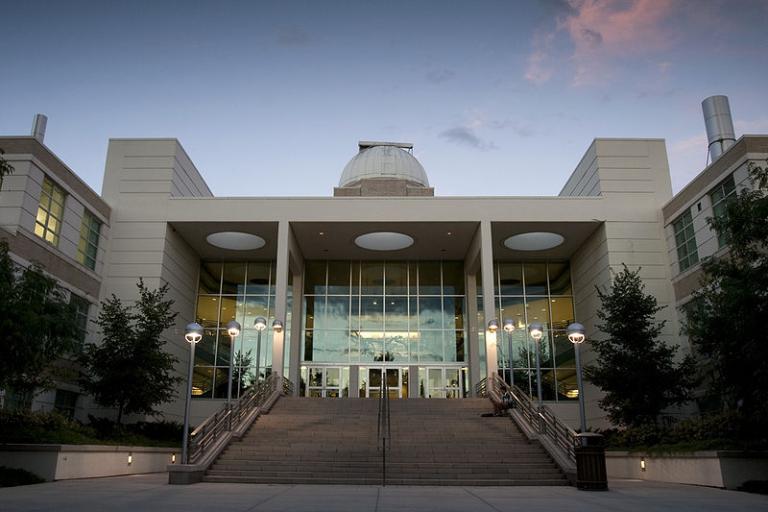
(A photo by Mark A. Philbrick of BYU; Wikimedia Commons)
Briefly, when I was a boy, there was a man in our southern California ward who had converted to Mormonism. (I seem to dimly recall that he was a former Catholic.) I can still see his face in my mind, and I remember that he spoke quite ungrammatically, which suggested that, while he was a kind and pleasant person, he wasn’t a well educated one.
I don’t recall his name, but I distinctly remember a talk that he once gave in sacrament meeting. It was a very unusual sacrament talk, in my experience, and, because it focused heavily on the errors of his previous denomination, a rather inappropriate one. (His choice of approach, I’m sure. Not by command of the bishop. I can’t think of another such talk in my ward. Ever.)
Anyway, he was speaking about the erroneous concept of God held by his former church, and he came to the concept of God as “incomprehensible.” Now this idea, he declared, is the most ridiculous of all: “How can he be God if he doesn’t comprehend anything?”
The speaker must have sensed movement in the audience — we were all shifting about in uncomfortable embarrassment — and, presumably inspired by that reaction, he expounded on the silly idea of God’s not comprehending anything for an unusually long time.
It was . . . awkward.
I’ve found myself thinking about him and that talk lately as I’ve read several items on predominantly atheistic ex-Mormon message board where a poster has taken to commenting frequently on my blog entries here. He marvels almost daily at my stupendous scientific ignorance, my incompetence, and my irrationality. In at least one recent post, he’s also been struck by my brazen dishonesty.
The problem, though, is that he consistently and grossly misreads the intent of my entries and continuously attributes views and arguments to me that I do not hold and that have never previously entered my mind.
The stupidity and ignorance and disingenuousness that he claims to see (and probably, given his viewpoint, really does see) in my posts is largely if not entirely an artifact generated by his own remarkably poor reading.
For instance, he’s responded to my recent spate of entries arguing for Joseph Smith’s sincerity by pointing out that one can be (and that many people are) sincerely wrong — as if I’ve ever argued or even suggested otherwise.
And, when I responded with a series of three posts to his demand for even a single example of an issue on which theologians were right while scientists were wrong — my responses can be read here, here, and here — he reacted with triumphant cackling that my response proved that I couldn’t do it. After all, if I’d had even a single example of such a case, I would have provided it! (When, as very small boys, we used to play “cops and robbers,” it was common for somebody who had been “shot” directly in the chest at point blank range to continue to play, exclaiming “You missed me!” and, in support of that assertion, adding an argument that went somewhat along the lines of “Neener neener neener!”)
The late Abba Eban, onetime remarkably eloquent foreign minister of Israel (and, incidentally, a first-rate Cambridge-trained Arabist), once lamented the sad history of the Palestinians, who, he said, had “never missed an opportunity to miss an opportunity.” My online critic seems, recently at least, never to miss an opportunity to completely miss the point — and then compounding his error by substituting transparently idiotic points of his own, but attributing them to me.
Recently, this zany fellow has been laughing at my supposed belief that science hasn’t progressed beyond the nineteenth century and at my putative assumption that quoting theologians from the late 1800s somehow refutes Darwinism. Or something like that. He derives this purported belief of mine from a recent blog entry titled “Is Darwinism necessarily atheistic?”
Oy veh.
Let me make the actual point that I was establishing unmistakably clear, in case there are any others out there who share this particular person’s difficulty:
I was offering an answer to the question “Is Darwinism necessarily atheistic?” I even provided a subtle clue to the fact that that was the question that I was answering, by explicitly putting the actual question in my title — which, to refresh memories, was “Is Darwinism necessarily atheistic?”
My answer, by the way, is No.
In that part of my response to the question, I cited Frederick Temple (future archbishop of Canterbury), Charles Kingsley (chaplain to Queen Victoria and canon of Westminster), and the Harvard botanist Asa Gray — all of them devout Christians and all of them perfectly fine with (or even zealous advocates of) Darwinism. I also cited Charles Darwin himself, who plainly didn’t think that Darwinian evolution required or mandated atheism.
All of these figures lived in the nineteenth century. They strongly suggest (and other, similar, evidence is available in abundance) that the notion of an all-out war between nineteenth-century Christianity or theism, on the one hand, and nineteenth-century Darwinism, on the other — a war with clearly drawn, black and white battle lines — is untrue.
I never suggested in any way that evolutionary theory in particular or science in general ceased to develop after the nineteenth century, and I was making no effort to refute or redefine Darwinism.
In my just-posted follow-up to that post — titled, perhaps too opaquely, “Is Darwinism necessarily atheistic? (Part Two)” — I cite Harvard’s Stephen Jay Gould, who died in 2002. Which, I suppose, can be taken to mean that I believe that scientific progress in general and developments in evolutionary biology in particular ceased around the time that the Winter Olympics were held in Salt Lake City. Or something of that sort.















